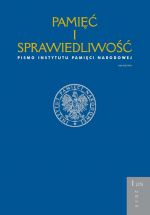"Profesorowie, którzy nie kształtują światopoglądu marksistowskiego, a wzdychają do dawnych czasów”. Epizod z dziejów polskiego szkolnictwa wyższego w okresie stalinowskim na przykładzie lubelskiego UMCS
“Professors Who do Not Shape Marxist Ideology but Long For Old Times”. The Episode in the History of Polish Higher Education in the Stalinist Period on the Example of the Maria Curie-Sklodowska University in Lublin
Author(s): Marcin KruszyńskiSubject(s): History, Social history, Recent History (1900 till today)
Published by: Instytut Pamięci Narodowej
Keywords: Maria Skłodowska-Curie University; University Committee of the Polish United Workers’ Party; professors
Summary/Abstract: The Stalinist period in Poland was the time of the strongest attempts by the communists to form a new sort of intellectual, in fact, their own intellectual. One who would not independently ‘understand the nature of things,’ but would do so with obedience, pursuant to the will and demands of the party. This metamorphosis, controlled from the top and executed according to the Soviet model, required a desacralization of the ethos of the intellectual whilst, in the stricte academic world - a transformation of universities from the ‘sacrum of knowledge’ into a producer of professionals/specialists. In addition, there appeared the necessity to exchange places in the master-student system, when the latter became the leader, initiating the academic system of a classless society. In practice, this meant a fierce attack on the pre-war academic staff, who were distrustful towards those in power. Young assistants/deputy assistants of a proper social origin (workers or peasants), entering universities by way of educational shortcuts like, for example, Preparatory Study, without a feeling of impropriety or of breaking age-old rules, destroyed the existing academos. They did not feel uncomfortable when breaking the rules since they were intruders in an area which, under normal conditions, they would never have entered. All thesephenomena, as a case study, were portrayed in the example of Maria Skłodowska-CurieUniversity. The significance of that university is that it was founded by a decree of the PolishCommittee of National Liberation and, in that sense, it had at least a symbolic obligation to identify itself with the political system of that time. Such an approach – a case study – also provides an opportunity to take a closer look at the mentality of those who destroyed the old order, the new ‘fierce’ ones who had risen socially in an unprecedented manner.
Journal: Pamięć i Sprawiedliwość.
- Issue Year: 25/2015
- Issue No: 1
- Page Range: 199-220
- Page Count: 22
- Language: Polish

